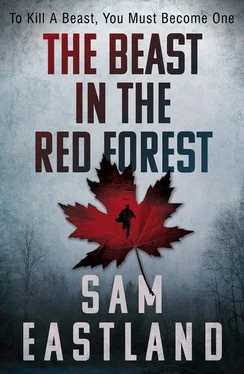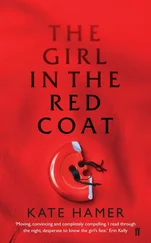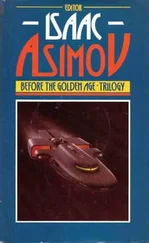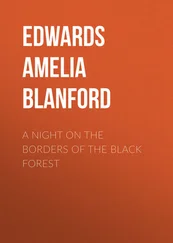Sam Eastland - The Beast in the Red Forest
Здесь есть возможность читать онлайн «Sam Eastland - The Beast in the Red Forest» весь текст электронной книги совершенно бесплатно (целиком полную версию без сокращений). В некоторых случаях можно слушать аудио, скачать через торрент в формате fb2 и присутствует краткое содержание. Год выпуска: 2013, ISBN: 2013, Издательство: Faber & Faber, Жанр: Исторический детектив, на английском языке. Описание произведения, (предисловие) а так же отзывы посетителей доступны на портале библиотеки ЛибКат.
- Название:The Beast in the Red Forest
- Автор:
- Издательство:Faber & Faber
- Жанр:
- Год:2013
- ISBN:9780571281466
- Рейтинг книги:4 / 5. Голосов: 1
-
Избранное:Добавить в избранное
- Отзывы:
-
Ваша оценка:
- 80
- 1
- 2
- 3
- 4
- 5
The Beast in the Red Forest: краткое содержание, описание и аннотация
Предлагаем к чтению аннотацию, описание, краткое содержание или предисловие (зависит от того, что написал сам автор книги «The Beast in the Red Forest»). Если вы не нашли необходимую информацию о книге — напишите в комментариях, мы постараемся отыскать её.
The Beast in the Red Forest — читать онлайн бесплатно полную книгу (весь текст) целиком
Ниже представлен текст книги, разбитый по страницам. Система сохранения места последней прочитанной страницы, позволяет с удобством читать онлайн бесплатно книгу «The Beast in the Red Forest», без необходимости каждый раз заново искать на чём Вы остановились. Поставьте закладку, и сможете в любой момент перейти на страницу, на которой закончили чтение.
Интервал:
Закладка:
From the office of Comrade Joseph Stalin, Kremlin to Ambassador Joseph Davies, US Embassy, Mokhovaya Street, November 23rd, 1937
Ambassador -
On behalf of Comrade Stalin, I acknowledge receipt of your letter regarding Mr William H. Vasko. In view of the sensitive situation and as witness to the unbreakable bonds between our two great nations, Comrade Stalin has instructed me to inform you that he has assigned Inspector Pekkala, of the Bureau of Special Operations, his most capable investigator, to personally undertake an examination of this case. Comrade Stalin adds that he looks forward to your favourable news regarding the purchase of American cargo ships.
With great respect,
Poskrebychev
Secretary to Comrade Stalin
*
Memo from Joseph Stalin to Pekkala, November 23rd, 1937
Find out what is going on here and report back to me as soon as possible. William Vasko is being held at Lubyanka, prison number E-151-K.
*
From Inspector Pekkala, Special Operations, to Henrik Panasuk, Director, Lubyanka, November 23rd, 1937
You are hereby ordered to suspend all interrogation of prisoner E-151-K, William Vasko. He is to be transferred to a holding cell pending investigation by Special Operations.
As Pekkala strode along, Kirov struggled to keep pace. ‘Where are we going, Inspector?’ he asked.
‘We must return to the place where you were shot. Valuable evidence may be lost if we do not move quickly, and we must take advantage of the mistakes this assassin has made.’
‘What mistakes, Inspector?’
‘Leaving you alive, for one! By doing so, he left a witness to his crime.’
‘But Inspector, that was no mistake.’
Pekkala stopped in his tracks. ‘You mean he knew you were still breathing?’
‘Yes, Inspector. He saw me lying there. I was wounded, but still conscious.’
‘Why didn’t you shoot him?’
‘Everything had happened so quickly that my gun was still in its holster. I couldn’t get to it. I was completely helpless. I was certain he would finish me off, but he didn’t.’
‘Then he was sending a message,’ remarked Pekkala. ‘The question is, to whom?’
‘That day in the bunker,’ said Kirov, ‘when I asked the partisans if they had seen or heard of you, they spoke of rumours that a Finn was living among the Barabanschikovs, but both of them refused to take me to the Red Forest.’
‘They call it the country of the beast,’ replied Pekkala. ‘And they avoid it at all costs.’
‘So if nobody goes there,’ asked Kirov, ‘how on earth did you find them?’
‘I didn’t,’ answered Pekkala. ‘They were the ones who found me.’
*
After ambushing the truck that contained the stolen panels of the Amber Room, Pekkala knew that if he carried out his orders and destroyed them, Stalin would allow the blame to fall upon him, rather than accept responsibility himself. By liquidating Pekkala as soon as he returned to Moscow, Stalin would ensure that no word of the mission was ever traced back to the Kremlin.
Reluctant as he was to destroy the panels, Pekkala was certain that if he refused to carry out the order, Stalin would only send another to take his place, and another after that until the grim task had been completed.
Standing amongst the casualties of the battle, who lay strewn across the road amongst spatters of congealed arterial blood, Pekkala realised that he had no choice except to complete the mission, and then to fake his own death, before going into hiding.
After placing his Webley and pass book on the body of a soldier killed in the attack, he removed a flare gun from the driver’s compartment of the truck which had been halted in the ambush. Then he unlatched a 20-litre fuel can from its mountings on the running board and doused the vehicle, as well as the body he had chosen. He poured the last of the fuel on to an armoured car which had been escorting the convoy and which lay upside down in a gulley, its muffler pipes skewed out like antlers on the carcass of a deer.
When everything was ready, Pekkala gathered up a rifle from among the weapons which lay scattered on the ground, then fired one flare into the truck and another into the armoured car.
As a wall of boiling orange flame rose up from the explosions, Pekkala sprinted for the shelter of the trees. It would not be long before the vast column of black smoke was spotted by a squadron of German cavalry who had been sent into the forest to pursue him.
Pekkala kept moving until sunset, when he came upon a cluster of houses which had recently been destroyed. The cavalry had been here. Empty cartridges from Mauser rifles littered the ground. Pekkala went to drink from the well in the centre of the compound, but when he threw down the bucket on its rope, he heard it strike against something hard. As he peered into the darkness, he saw a pair of bare feet floating upside down just below the surface of the water.
Travelling mostly at night, he pressed on through the swamps, wading hip-deep in the tar-black water past peeping frogs whose ball-bearing eyes glinted amongst the reeds. When exhaustion overtook Pekkala, he struggled to dry ground, covered himself with leaves and slept while mist drifted around him like the sails of phantom ships.
In his restless dreams, Pekkala saw himself caught and hanged by the men who were hunting for him now. The grotesque image swung like a pendulum from darkness into view and into darkness once again.
When turquoise banners trailed across the evening sky, Pekkala rose up from his shroud of leaves and continued on his way.
For weeks, Pekkala headed south, keeping to the forests, deserted valleys and roads so seldom travelled that they had all but been reclaimed by the wilderness from which they had been cut. All this time, he was pursued by an enemy whose numbers seemed to grow with every day. From hiding places in the bramble undergrowth, Pekkala watched them riding by, the hooves of their horses sometimes no more than an arm’s length away.
These cavalry men were used to open country, not the stifling confines of the forest and he realised they, too, were afraid.
Ultimately, it was the sheer size of their force which proved to be Pekkala’s greatest ally. He learned to watch for the dust kicked up by their horses and he listened to the plaintive wail of bugles calling from one squadron to another as they meandered lost among the alder thickets. After dark, he glimpsed the orange tongues of their campfires and when it rained and they could make no fires, he smelled the bitter smoke of Esbit cooking tablets used by German soldiers to heat their rations.
Only once did Pekkala come close to being caught, one night when he almost stumbled into one of their encampments. Their shelters had been sturdily built with pine-bough roofs and camouflage rain capes covering the entrances, on either side of a stream. Their horses had been tethered to a nearby tree.
Slipping into the water, Pekkala gritted his teeth against the shock of cold. Moonlight turned the stream into a flood of mercury. He waded hunchbacked through the rustling of current, hoping to pass unnoticed between the dugouts.
Pekkala was just coming level with the German positions when he heard the rustle of a rain cape being thrown back. The horses shifted nervously. Sidestepping into the weeds, Pekkala crouched down among the bristling stalks. Ten paces upstream, a man emerged from one of the dugouts. He walked to the edge of the bank. Moments later, a silver arc reached out into the dark. The soldier leaned back, gazing at the stars, then hawked and spat as he buttoned up his fly. The tiny island of saliva drifted past Pekkala’s hiding place as the soldier returned to his dugout.
Pekkala moved on, deeper and deeper into the wilderness, through storms which thrashed his face with sheets of rain while lightning, like a vast electric spider, stalked the earth. When the rain stopped, he could smell wild grapes on the breeze, the scent so sweet and heavy that it hummed like music in his brain.
Читать дальшеИнтервал:
Закладка:
Похожие книги на «The Beast in the Red Forest»
Представляем Вашему вниманию похожие книги на «The Beast in the Red Forest» списком для выбора. Мы отобрали схожую по названию и смыслу литературу в надежде предоставить читателям больше вариантов отыскать новые, интересные, ещё непрочитанные произведения.
Обсуждение, отзывы о книге «The Beast in the Red Forest» и просто собственные мнения читателей. Оставьте ваши комментарии, напишите, что Вы думаете о произведении, его смысле или главных героях. Укажите что конкретно понравилось, а что нет, и почему Вы так считаете.











